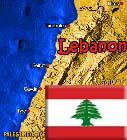Lebanon leaders enter dialogue, will talk again in November
 Beirut - Lebanon's political leaders have closed the first session of a national political dialogue on Tuesday aimed at resolving the country's long-standing difficulties, vowing to hold a second session in November.
Beirut - Lebanon's political leaders have closed the first session of a national political dialogue on Tuesday aimed at resolving the country's long-standing difficulties, vowing to hold a second session in November.
"The participants have set November 5 as the date for their second session," a statement released by the dialogue, which was led by Lebanese president Michel Suleiman, said.
The statement called on leaders to stop their "fiery political statements against each other to prepare grounds for the second session and pave the way for more reconciliations."
The session, which lasted almost four hours, took place amid a "comfortable and friendly atmosphere," said one of the participants who requested anonymity.
Among the participants were Prime Minister Fouad Seniora, ruling majority leader Saad Hariri and parliamentary speaker Nabih Berri.
Phalange Party leader Amin Gemayel, Free Patriotic Movement leader Michel Aoun, Progressive Socialist Party leader Walid Jumblatt and the head of Hezbollah's parliamentary bloc Mohammed Raad, as well as Christian Lebanese Forces leader Samir Geagea were also in attendance.
But some of the leaders, such as Christian rivals Michel Aoun, who is a a member of the Hezbollah-led opposition and Samir Geagea, who backs the anti-Syrian ruling majority "did not shake hands or engage in any type of friendly chit-chat during the dialogue session," a participant said.
The talks in November are set to focus on forming a "national defense strategy" in which the relationship between militias and the army in defending the country is to be defined, the source said.
Controversy over Hezbollah's stocks of weaponry intensified after its fighters captured two Israeli soldiers in a cross-border raid in July 2006 that sparked a 33-day war that devastated Lebanon.
It boiled over again when Hezbollah led an armed takeover of large parts of predominantly Sunni west Beirut that left 82 dead during unrest in May, the worst violence since the 1975-1990 civil war.
The national dialogue follows on from a 2006 initiative in which 14 major Muslim and Christian, pro- and anti- Syrian leaders held several round-table meetings in hopes of forging political unity.
The talks were interrupted by the war between Israel and Hezbollah.
The Syria- and Iran- backed opposition has recently been calling on the expansion of the dialogue to include more opposition leaders, while the Western-backed ruling bloc rejected this position.
The fourteen leaders began their talks on Tuesday at the Baabda presidential palace around a table that grouped the main rival factions.
Addressing the gathering, President Suleiman said "the small state of Lebanon has no other option but to be united to face challenges targeting the region."
He called "for sacrifices and concessions in favor of Lebanon and its dignity," stressing that the dialogue would open a window to calm dialogue, discussions and respect of opinions. (dpa)